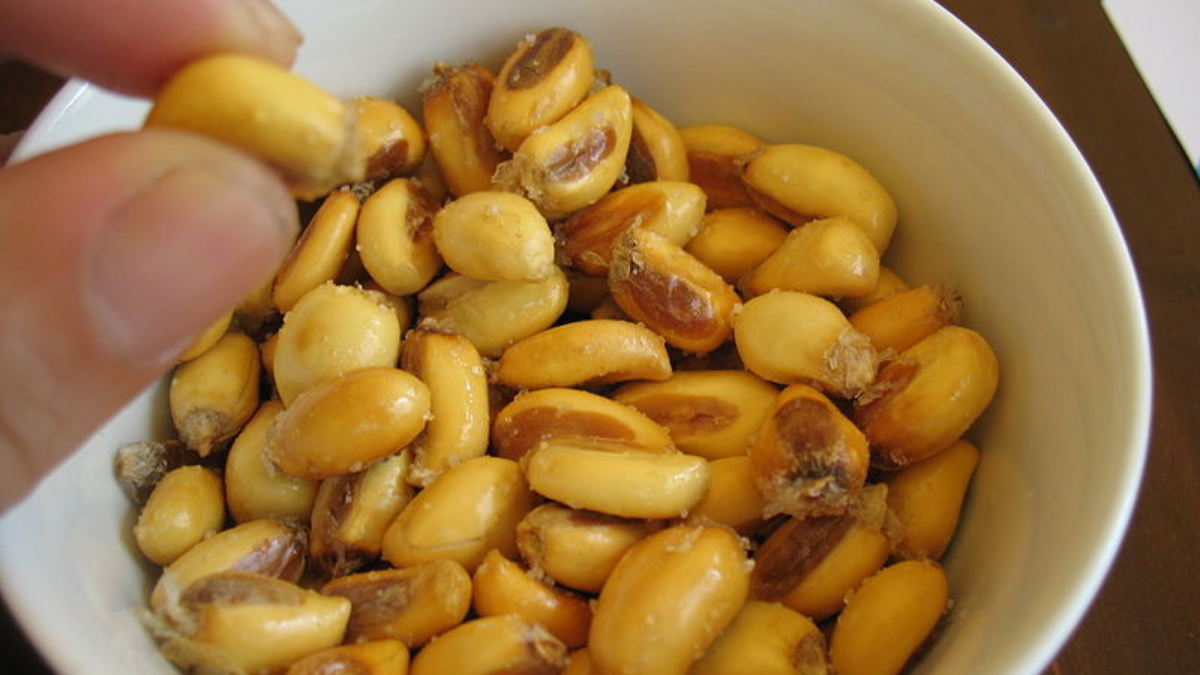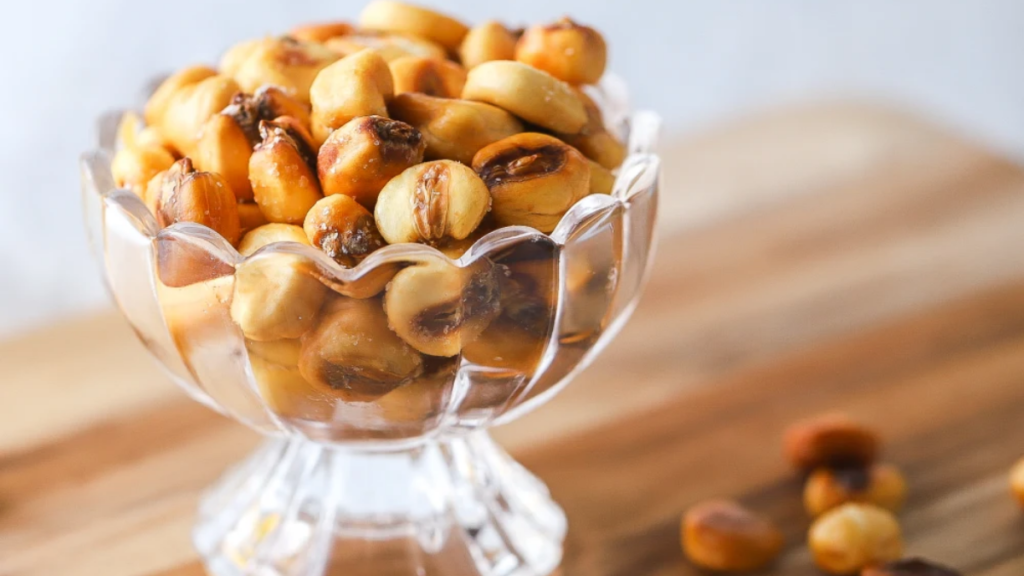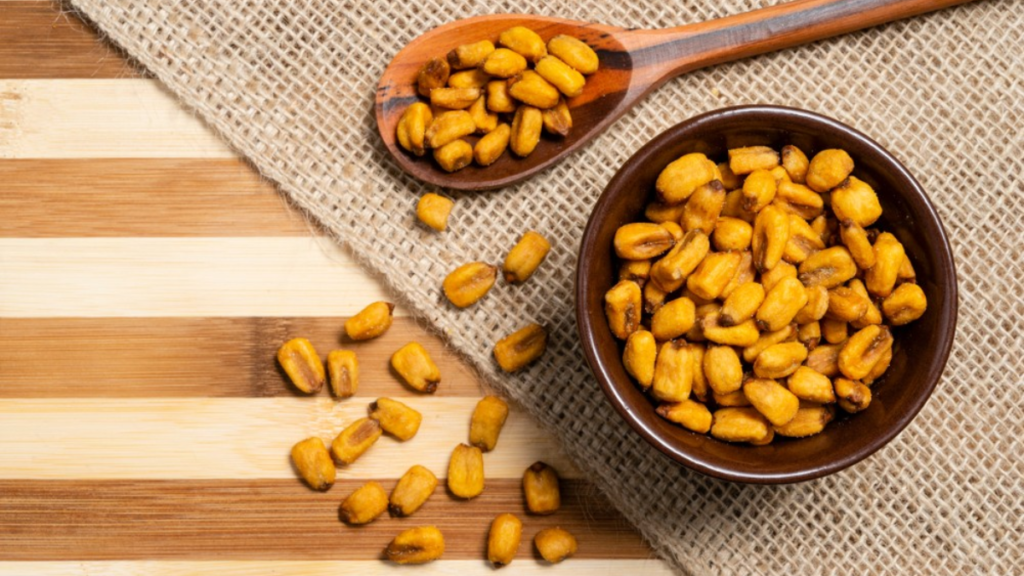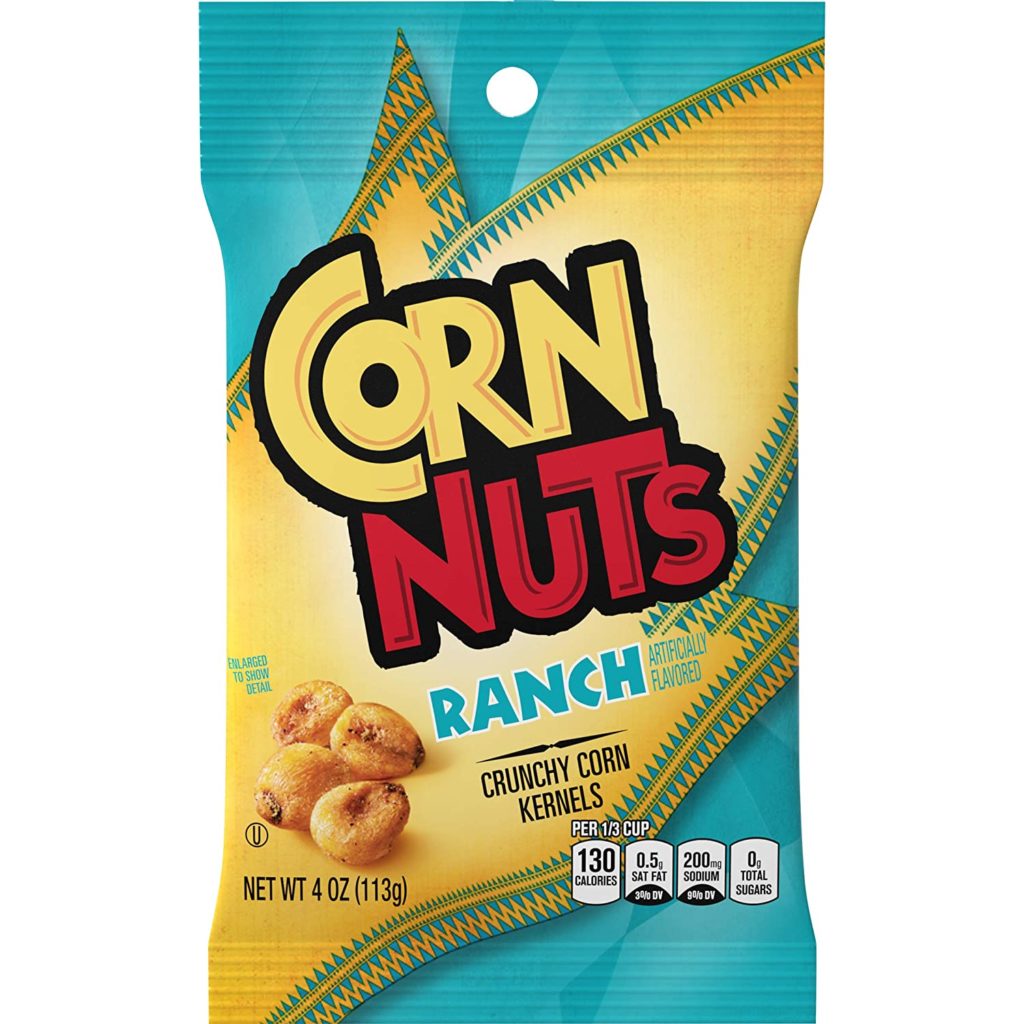You might need a healthy snack to satisfy you in between meals to keep hunger at bay. Corn nuts meet some of the criteria for a healthy choice, with heart-healthy fat, protein, and fiber. On the other hand, corn nuts are high in calories and may push you over the edge if you’re trying to lose weight. Corn nuts have 436 calories per 100 grams, 9 grams of protein, and 14 grams of fat in every 100 grams.
Like any other snack, Corn nuts can be part of a healthy diet if consumed in moderation. They have an advantage over many chips and crackers because they are low in calories. However, if consumed in large quantities, they can be high in fats.
Corn Nuts Nutrition Facts
Here’s a table for Corn Nuts Nutrition Facts based on a serving size of 100 grams. Percent daily values are based on a 2,000-calorie diet:
| Nutrient | Amount per serving | % Daily Value |
| Calories | 464 kcal | 23% |
| Protein | 7 g | 14% |
| Fat | 23 g | 35% |
| Saturated Fat | 3 g | 15% |
| Carbohydrates | 58 g | 19% |
| Fiber | 7 g | 28% |
| Sugar | 4 g | – |
| Sodium | 536 mg | 22% |
Note: Please note that the nutrient content of corn nuts can vary slightly depending on the specific brand and flavor.
What are Corn Nuts?
Corn is a nutrient-dense food that may also be used in various ways. It can be found in various forms worldwide, including kernels, meals, grits, polenta, and the American classic, corn on the cob. Native Americans introduced it to American settlers as a snack in the form of popcorn. Corn nuts are a snack food that many people are unfamiliar with, and whole corn kernels are toasted to make them.
The maize nut was invented in the United States in the twentieth century. The earliest ones were made with regular corn kernels. After some testing and study into refining the original product, the developer identified a Peruvian corn type that produced 1-inch (2.54-cm) kernels, more than the size of American sweet corn. In the 1960s, gigantic Cusco corn kernels were used to create the first corn nuts sold in the United States.
Corn nuts are made with hybrid corn that yields extra-large kernels, which snack food makers use. Corn nut snacks sold in stores begin with a water soak to plump the seeds before cooking. Seasonings are added to the roots once they are ready to cook. They then roast the corn kernels in the oven or fry them in oil until they are crunchy. Fried seeds may contain more calories than toasted ones.
What are the Health Benefits of Corn Nuts?
Aside from its vitamin and mineral richness, corn has several health benefits. Corn contains various antioxidants and beneficial plant chemicals that protect against disease, depending on the color.
Reduces Risk of Type 2 Diabetes
Whole grains, fruits, vegetables, and nuts contain polyphenols and nutritional plant components. Purple corn gets its color from anthocyanin, a polyphenol used to help regulate insulin and glucose levels.
Purple maize, for example, is a proactive strategy to avoid the formation of type 2 diabetes by including a range of colorful, plant-based meals in your meal plan. Consider the carbohydrate count if you have diabetes and want to include purple corn in your diet.
May Help Prevent Colon Cancer
Corn is high in fiber, which encourages the formation of “good bacteria” in the stomach. To help prevent colon cancer, these bacteria create short-chain fatty acids. Fresh corn, popcorn, and other whole-grain corn products will provide you with the most fiber.
Protects Eyesight
Lutein and zeaxanthin, two forms of vitamin A that are particularly beneficial for eye health, are abundant in corn. Because they build up in the retina, these compounds have a link to preventing age-related macular degeneration. It has been demonstrated that lutein and zeaxanthin, as well as vitamin C, vitamin E, copper, and zinc, protect against this common cause of vision loss (all of which are contained in maize).
Promotes Heart Health
Corn has several nutrients that have been shown to have cardiovascular effects. Whole grains have fiber, which helps lower cholesterol levels. Corn provides around 6% of the daily value set by the FDA for potassium, which is well-known for lowering blood pressure.
Are Corn Nuts Bad for you?
Corn grains contain saturated fat, which can act as a catalyst for plaque formation in arteries, raising the risk of heart disease, heart attack, and stroke. Corn nuts are high in unsaturated fats, which help lower cholesterol and keep the heart healthy. They are, however, still cumbersome in fat for a snack meal that is essentially devoid of other nutrients.
Corn grains have a very high salt content. Headaches, high blood pressure, and, in severe cases, stroke or renal failure, are all side consequences of high salt levels in the bloodstream. Furthermore, artificial colors and flavors may be present in aromatic corn nuts, which may harm some people’s digestive and immune systems.
While a single serving of corn nuts isn’t bad, it’s crucial to remember that most corn nuts packages contain four or more servings. This means that consumers will eat a lot of corn nuts, resulting in a high fat and sodium intake, yet nothing negative will happen to them. While a serving is OK as an occasional snack, doctors do not recommend consuming vast quantities of corn nuts.
Varieties
Dent corn, flint corn, popcorn, and sweet corn are the four fundamental forms of corn. Field corn is another name for dent corn. It’s utilized in livestock feed as well as food. Flint corn looks like dent corn but comes in a range of colors. It is categorized as decorative corn and typically marketed as such.
Popcorn has a robust outer shell with a mushy, starchy core that steams and explodes when heated. Sweet corn contains more starch and sugar than regular corn. It is harvested when it is still young and fragile. Sweet corn kernels can be white, yellow, or hue. Sweet corn is what you get when you buy corn on the cob.
When It’s Best?
From July to September, fresh corn is available during the summer months. Choose maize with whole, firm kernels. Any cobs that show mold, insects or deterioration symptoms should be avoided.
Fresh corn is available in the stalks or is already shucked. Corn goods, such as canned and frozen corn, are readily available. With a cream sauce and salt or sugar, canned corn is frequently served.
Look at the ingredients label to find out what’s in your product. Corn-based products, including popcorn, cornmeal, starch, flour, grits, and porridge, are available all year long in grocery shops.
How to Prepare?
While corn is typically cooked, it can also be consumed uncooked. Corn can be roasted, boiled, microwaved, or steamed once the skins and husks have been removed. Simply clip the kernels from the cob to add a delightful crunch to salads or other favorite foods.
To roast or grill, keep the husks on; to serve, take them off. Corn is naturally sweet, so it doesn’t require much flavoring to be enjoyable. Keep corn recipes simple to enjoy the natural flavor and nutrition this whole-grain offers.
Corn Nuts Ranch Crunchy Corn Kernels
Features:
- Twelve four oz. bags of Corn Nuts Ranch Crunchy Corn Kernels
- Corn Nuts Ranch Crunchy Corn Kernels deliver bold flavor and the ultimate crunch
- Snack-size packaging offers on-the-go convenience
- Grab a bag of corn nuts for gaming sessions and movie nights
- Corn nuts complement soft drinks
- Ranch corn nuts contain 130 calories per serving
- Great for those keeping Kosher
Conclusion
Corn nuts have a high carbohydrate content and a low straightforward sugar content. They’re a low-cholesterol snack. Because most people do not consume the required daily fiber, eating fiber-rich snacks is an innovative method to help them meet their daily fiber target.
Corn is high in fiber and plant chemicals, which may help digestion and vision. When consumed in excess, however, it is high in starch, can increase blood sugar, and may hinder weight reduction. Corn is one of the most genetically modified foods available. Sweet corn accounts for 1% of all corn farmed in the United States, most of which is not genetically modified. Sweet corn is available frozen, tinned, or fresh.




